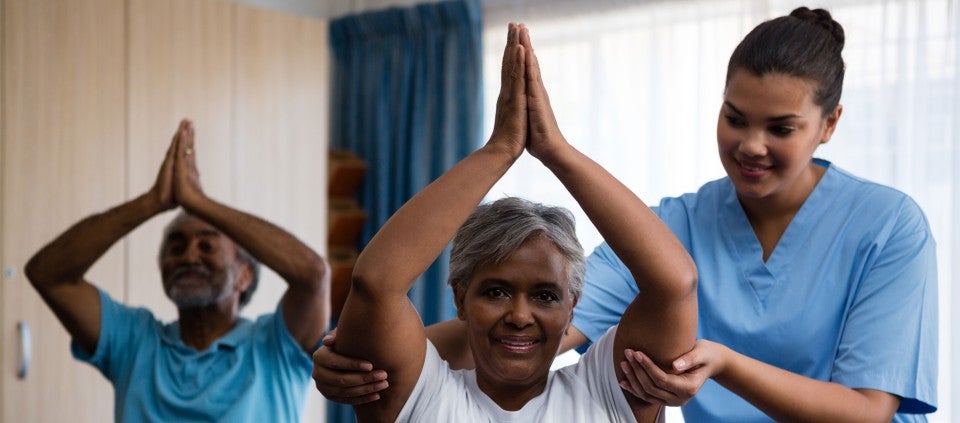From the Mat to the Clinic: Yoga Enters Mainstream Medicine

by Bess Hochstein
At tax time, I go through my records (basically a box of receipts), and pull one out and set it aside. It’s a receipt for yoga classes and, thanks to my forward-thinking health insurance plan, I get reimbursed for the cost.
That’s a relatively new-to-me benefit. Gym memberships have commonly been reimbursable through some insurance plans, but yoga doesn’t often qualify. I see this as a significant change—many health insurance companies have expanded their perspective to encompass wellness rather than just rote fitness in terms of preventive measures. And they’ve also begun to see the beneficial effects of yoga on the overall well-being of their plan members.
Hospitals, too, are opening their doors to yoga; many have added on-site wellness centers offering yoga and meditation classes. Others are bringing yoga to patients who might not be adequately ambulatory to attend a class.
The highest-profile of these initiatives is the Urban Zen Foundation, created by DKNY fashion designer and longtime yoga practitioner Donna Karan. The foundation has funded yoga programs in prestigious hospitals on both coasts—Beth Israel in New York City and UCLA Hospital in Los Angeles—offering certification training in yoga therapy, meditation, and other holistic modalities to the hospitals’ staff, including doctors, nurses, and social workers. The foundation’s pilot program at Beth Israel has been credited with substantial benefits to patients—including a reduction of pain and anxiety, better rest, improved moods, more rapid healing, shorter hospital stays, and reduced need for medications—which also translates into significant cost savings to the hospital.
Lisa B. Nelson, MD, Director of Medical Education at Kripalu and a family practice doctor in Pittsfield, Massachusetts, frequently recommends yoga for general wellness, stress reduction, musculoskeletal complaints, and also for depression, anxiety, eating disorders, and insomnia. “There are many types of yoga offered in our community, so sometimes I will even tailor the type that I recommend—for instance, yoga nidra for insomnia or anxiety, or hot yoga for diffuse musculoskeletal tension,” she says.
Though Lisa says it’s still somewhat rare to find providers who go out of their way to prescribe yoga, those wanting to integrate yoga into their wellness regimens don’t have to go it alone. A new breed of nurses is being trained to provide appropriate holistic care, or, as the International Nurse Coach Association (INCA) website puts it, to “speak both the languages of medicine and healing.” INCA offers nurses rigorous training programs leading to certification as health and wellness nurse coaches, able to draw from an arsenal of complementary, evidence-based methodologies and tools—including yoga, tai chi, meditation, and breathwork—that can be practiced anywhere, from clinical settings to the home.
As codirector of INCA and a core faculty member of the Integrative Nurse Coach Certificate Program, nursing pioneer and Kripalu presenter Barbara Dossey, PhD, RN, has inspired healthcare workers across the country and internationally to take a more holistic approach with patients. In a world where doctors are under severe time pressure, she teaches how important it is to take time with clients: “Listen to their stories; see where the big challenges are in their lives.” She exhorts her students to get a picture of the whole person, including diet, exercise, relationships, work, home environment, and spiritual outlook. By taking the time to listen, nurse coaches can determine which modalities are best suited to a client’s situation.
Barbara also guides program participants to practice self-care and find more balance and harmony in their lives. As an integrative nurse coach, Barbara says, “you have to walk the talk; you have to model it.”
Annette Tersigni’s YogaNurse program trains nurses to use yoga in their healthcare practice. Annette says that the idea for melding yoga and nursing came to her in the mid-1990s during an Ayurvedic training with Deepak Chopra. Already a full-time yoga teacher (following a career as an actress and model), she decided to become a registered nurse. When she graduated from nursing school, Annette recalls, “It became crystal-clear that there was a natural fit between traditional Western-based nursing knowledge and the ancient Eastern science of yoga. The marriage of therapeutic yoga and nursing offers people the best of both worlds and ensures the greatest success in their healing.”
Annette, who counts Barbara as one of her mentors, has treated thousands of clients and patients with all types of conditions. “Heart and lung disease, cancer, diabetes, orthopedic challenges, obesity, MS, Parkinson’s, geriatrics, women’s health, and, of course, epidemic stress and sleep disorders are areas where yoga offers countless benefits,” she says.
Personally, I was cheered to see my own physician show up in yoga class recently. Now I know that, when I arrive for an appointment, he’ll have a better grasp of my lifestyle and we’ll be able to speak a common language.
Bess Hochstein, a freelance writer based in the Berkshires, writes about yoga, travel, the arts, and culture.